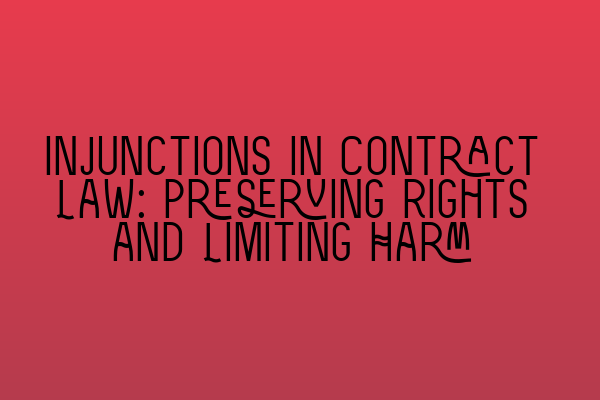Injunctions in Contract Law: Preserving Rights and Limiting Harm
Contracts are the backbone of commercial transactions, ensuring parties uphold their promises and obligations. However, there are situations where one party may breach the terms of a contract, causing harm to the other party. In such cases, individuals or businesses have the option to seek legal remedies to protect their rights and limit the damage caused. One powerful legal remedy in contract law is an injunction.
What is an Injunction?
An injunction is a court order that prohibits or compels a specific action. In the context of contract law, it is a tool used to maintain the status quo and prevent harm or further harm to the party seeking relief. Injunctions can be temporary or permanent, depending on the circumstances of the case.
Temporary injunctions, also known as interim injunctions, provide immediate relief to the aggrieved party until the matter is fully resolved in court. They are designed to prevent irreparable harm that may occur in the interim period. On the other hand, permanent injunctions are issued at the conclusion of a legal proceeding and are meant to provide a long-term solution.
It is important to note that obtaining an injunction is not automatic. The party seeking an injunction must demonstrate the following key elements:
- Likelihood of success: The party must show that they have a strong case and are likely to succeed in proving that a breach of contract has occurred.
- Irreparable harm: The party must demonstrate that the harm caused or that may be caused cannot be adequately compensated through monetary damages alone.
- Balance of convenience: The court will consider the overall balance of convenience in granting or denying an injunction. This involves weighing the potential harm to both parties and any specific circumstances of the case.
Once these elements are established, the court will consider whether an injunction is the appropriate remedy and will issue the appropriate order to preserve the rights of the party seeking relief.
Types of Injunctions in Contract Law
Injunctions in contract law can take various forms, depending on the specific circumstances of the case. Here are some common types of injunctions:
- Mandatory injunction: This type of injunction compels the breaching party to perform a specific action. For example, if a party fails to deliver goods as per the contract, a mandatory injunction may require them to deliver the goods as agreed upon.
- Prohibitory injunction: A prohibitory injunction, on the other hand, prohibits the breaching party from taking a specific action. For example, if a party is about to disclose confidential information in violation of a non-disclosure agreement, a prohibitory injunction can prevent them from doing so.
- Freezing injunction: Also known as a Mareva injunction, a freezing injunction is designed to prevent a party from disposing of or dissipating assets or funds that may be subject to a judgment. This type of injunction ensures that the aggrieved party can recover their damages if successful in the legal proceedings.
- Anton Piller injunction: An Anton Piller injunction grants the party seeking relief the right to search the premises of the breaching party and seize relevant evidence. This injunction is commonly used in cases involving intellectual property infringement or theft of confidential information.
The Impact of Injunctions
Injunctions play a crucial role in contract law by preserving the rights of parties and preventing further harm. By obtaining an injunction, the aggrieved party can protect their interests and maintain the status quo until the dispute is resolved through legal proceedings.
Moreover, the existence of the option to seek injunctions acts as a deterrent against potential breaches of contract. Parties are more likely to fulfill their obligations when they know that failure to do so may result in legal consequences such as an injunction.
However, it is important to note that injunctions should not be sought lightly. They require a thorough assessment of the case and consideration of potential consequences. Seeking legal advice from a qualified contract law solicitor is crucial to determine whether an injunction is the appropriate remedy in a given situation.
Ultimately, injunctions provide an effective mechanism for individuals and businesses to protect their contractual rights and limit the harm caused by breaches. They are a valuable tool in preserving the integrity of contracts and ensuring fairness in commercial dealings.
If you found this article helpful and want to learn more about contract law or prepare for the SQE exams, check out our related articles:
